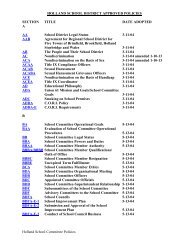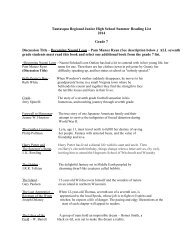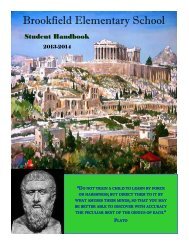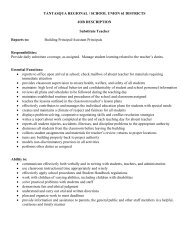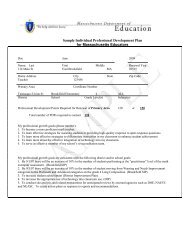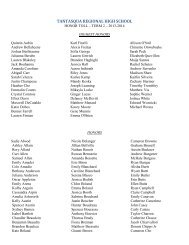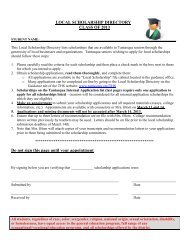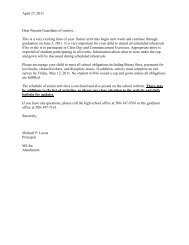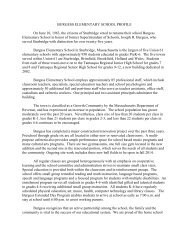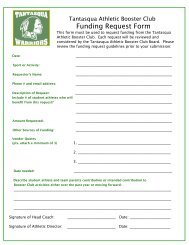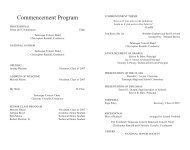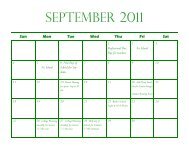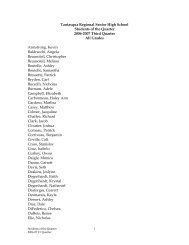AP Language and Composition - Tantasqua.org
AP Language and Composition - Tantasqua.org
AP Language and Composition - Tantasqua.org
You also want an ePaper? Increase the reach of your titles
YUMPU automatically turns print PDFs into web optimized ePapers that Google loves.
• Free writing: Iron John, mentors <strong>and</strong> the “guys” you know<br />
• What serious points underlie Barry’s humor What are his methods of humor If<br />
“everything is an argument”, what is his<br />
• Descriptive Writing: “An Attractive Person Enters a Room” Do two drafts: The second<br />
must be shorter than the first <strong>and</strong> you must explain to a partner how these changes<br />
improve the paper.<br />
Sentences, Grammar, <strong>and</strong> Style:<br />
o The Elements of Style: Rules 15-18<br />
o Warriner’s: Varying Sentence Length; Varying Sentence Beginnings<br />
o Group 4: Vocabulary List from all texts of problematic vocabulary, presented<br />
as a packet<br />
Major Paper : Course Culmination, first half: Gender Paper # 2.<br />
This is your first self-generated non-fiction work, asking that you apply all the rhetorical modes,<br />
rhetorical strategies, stylistic <strong>and</strong> the sentence skills in the curriculum so far. You must generate your<br />
own prompt. You may write on any one of the following topics/titles below. The challenge will be to find what<br />
your “take” on the topic will be. What angle will you explore, from what direction Here are six possible<br />
“Titles.” Given the nature of your choices of prompt, the only criterion is that the prompt you write fits the given<br />
title, however you choose to interpret the title.<br />
1. From ‘Tween to Teen….<br />
2. The Process So far: Becoming a Man/Woman in America<br />
3. What Do they Teach Teens: What Do We Learn<br />
4. An Argument against Gender: Closing the Great Divide<br />
5. What They Don’t Know About Us<br />
6. The Mentor<br />
Before the planning <strong>and</strong> writing begins:<br />
• First, what will be your audience This will shape your entire piece.<br />
• How will you make it interesting, compelling, <strong>and</strong> possibly original. Could this be a<br />
submission piece To whom Drawing on your own voice <strong>and</strong> experience.(You may assume<br />
a reader who is interested <strong>and</strong> not as knowledgeable as you are.)<br />
• Voice: How much ethos will you use How often will you use the first person (Is there a<br />
danger of too often) Will you use the editorial “we” (That is, speak as a teenager A girl A<br />
female ) Or will you be totally objective, a 3 rd person point of view, so that we can’t tell the<br />
age or gender of who wrote the piece<br />
• Also, what mode of rhetoric will you take That is, will you make an Argument, explore an<br />
Expository task (Do an Analysis or a Process or a Compare <strong>and</strong> Contrast) or even write a<br />
Narrative or Description that has sufficient weight<br />
• Will you use any sources, even briefly (If so, do a Works Cited page.)<br />
Unit F: Nature <strong>and</strong> the Individual Soul: 2 weeks<br />
Self Reliance, Address at Harvard Divinity<br />
Walden Selections: Economy, Where I Lived <strong>and</strong><br />
What I Lived For, Brute Neighbors<br />
Selection: Pilgrim at Tinker Creek<br />
The Death of a Moth<br />
How I Wrote The Moth Essay---And Why<br />
R.W. Emerson<br />
Henry David Thoreau<br />
Annie Dillard<br />
Annie Dillard<br />
Annie Dillard



